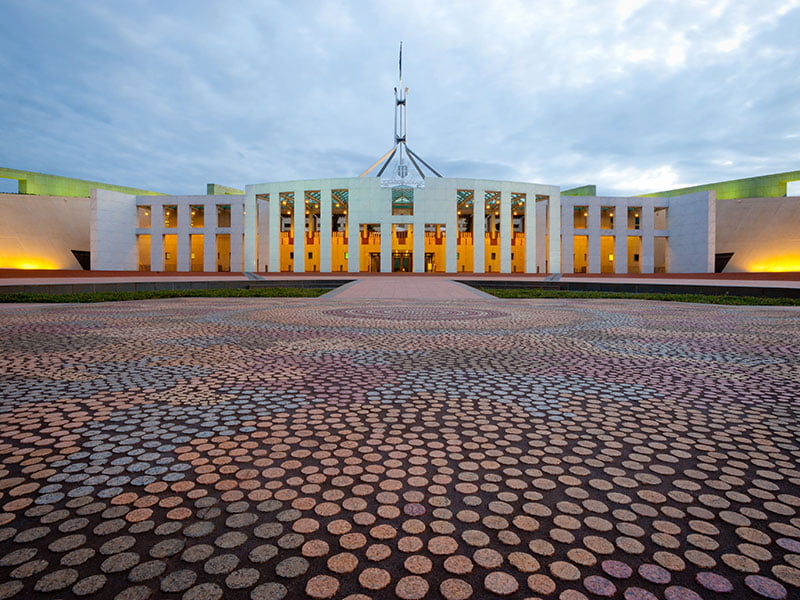The Prime Minister’s special envoy for cybersecurity and digital resilience Andrew Charlton says the path to prosperity lies in digitising the national economy, and that Australia’s “meal ticket” will be built in the global digital economy over the next several decades.
On a night dominated by policy presentations focused on the impact of artificial intelligence at the Tech Policy Design Institute’s Tech Futures event at Parliament House on Monday evening, Dr Charlton said there was an opportunity to build a “generation of prosperity” through digitisation.
“The Hawke and Keating governments signed up Australia to the international economy. They internationalised us, they set up a generation of prosperity,” Dr Charlton said.
“The biggest thing that we can do is to set Australia up for another generation of prosperity is to digitise the Australian economy, to recognise that the meal ticket of Australia will be built in the global digital economy over the next several decades.
“We need to work across every dimension of our government, of our industries, of our society, to grab that opportunity.”
Dr Charlton was the first of a series of rapid-fire, three-minute policy presentations from leaders in politics and civil society, who were asked to define the big ideas in tech policy that should form part of the election discussion.

He says the opportunity exists right now, and that the actions we take as a nation now “will determine when we’re sitting here in 20 years… whether we look back and see that Australia continued to prosper, continue to be one of the richest nations on Earth, or whether we fell behind.”
The policy presentations were dominated by themes related to artificial intelligence.
Retiring parliamentary veteran Paul Fletcher, who most recently held roles as shadow minister for government services and the digital economy, told the room that technology-driven opportunities for the economy were clear, but said convincing the average Australian of this upside was still a challenge.
“[Tech and AI] will create new jobs, new opportunities, new ways of doing things and productivity benefits,” Mr Fletcher said. “But the politics of this is not straightforward.”
“Don’t assume that everybody accepts the proposition that technological advance is a good thing,” he said. “Making the case in a way that is comprehensible and makes sense across the community is enormously important.”
That would mean pointing to sectors where Australian companies have built expertise and built successful industries, Mr Fletcher said. That would include areas like mining and remote automation, agricultural technology, or in Australia’s strong FinTech sector.
The sector has to be active in “making the case to all Australians, that this is good news… for our future. [That] this is going to make us all prosperous and have a better life,” he said.
Independent senator from the ACT David Pocock said the current parliament had “dropped the ball” on artificial intelligence, especially on the regulatory side.
Senator Pocock started by acknowledging that Industry minister Ed Husic and the government had “started out pretty well” in consultations on plans for AI regulation, but had not met its own timetable.
“I really think this parliament has dropped the ball when it comes to artificial intelligence,” he said, adding that the government had missed an opportunity to address AI-generated misinformation and disinformation ahead of the looming federal election.
“Artificial intelligence… is fundamentally going to change not just our economy, but our lives. We have to get ahead of it and actually have policies in place that puts some safeguards in place [and] assures people that it is going to be done safely.
Senator Pocock also used his three minutes to talk up the opportunities for locally-developed AI, and said the Australian government needed to better support local innovators through its procurement processes.
“Finally, on AI procurement. Procurement is something that we have to get better at as a country and looking locally, looking at the incredible world-leading tech that is being developed right under our noses,” he said.
“The first instinct [of governments] seems to be to look overseas, to look for the big, shiny thing that’s coming from the US. And I really think there’s an opportunity to change that.”
Tech Council of Australia Damian Kassabgi said a focus for the nation must be on continuing to build its home-grown technology sector – and that this was especially true in relation to building AI capability.
It was not enough for Australia to have a thriving technology ecosystem in Australia: It was critical that “we are creating the technology ourselves” as well.
“The problem is this: Our R&D investment per capita is going down compared to the OECD. We are a full percentage point behind the OECD average when it comes to R&D investment in this country,” Mr Kassabgi said.
“When you look at business investment [in R&D] – just pure business investment – we are one-third per capita that of the United States.
“And no matter what you think about the politics in United States, they have decided that this is their [path to] prosperity, that they’ve got a seat at the table and they’re creating this technology.
“It is our belief that Australia needs to lean in and work out how we can [also] have a seat at the table, invest in R&D and invest in the skills of the future.”
Do you know more? Contact James Riley via Email.

